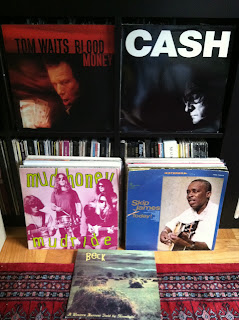Recently I picked up an original UK pressing of Pink Floyd's Wish You Were Here. I wasn't completely satisfied with the sound on the three copies of the album in my collection. In record collecting there is this thing called the country-of-origin rule. The record pressed in the country in which it was recorded is usually the best sounding version. There's a good reason for this to be true, as the original master tape usually stays in the country while copy tapes are made and sent abroad. So a record pressed in the US of an album recorded in the UK is at least one generation removed from the master tape. Thus I had hope that the UK pressing would have satisfying sonics.
I usually don't like to do listening tests where I compare different pressings back to back, but I felt an un-rocky-like surge of curiosity tonight. In the photo above, the various pressings are, from left to right: US quad, US, Holland, and UK. They're all original pressings. As you can tell in the photo, the US covers have a different photo from the Dutch and UK covers. I prefer the wider shot and the lean of the man-on-fire of the Dutch/UK photo.
The only song I compared was the title track. The Dutch pressing was played first. The song starts with a recording of a low-fidelity radio. It's hard to tell the sound quality of a record from this part. The first test is a feint mechanical whining sound in the background, similar to the sound of whistling tea kettle, that changes pitch. It sounded clear on the Dutch pressing. Then comes an acoustic guitar solo. This also sounded excellent. Next up is Roger Waters' vocal. His voice sounded slightly veiled. When he's joined by the other instruments, the sound gets congested and the veil gets a little thicker. Most of the sound is centered between the speakers.
Next I listened to the US pressing. The whining sound isn't as clear at the beginning. The pitch is uncertain. The sound of the acoustic guitar is clear, but the notes don't have as long a tail as on the Dutch pressing, i.e., the natural diminuendo of a plucked string was shortened. Waters' vocal sounds about the same as on the Dutch pressing. When the band joins in, the sound is less congested than on the Dutch pressing. The instruments are spread out a little more but still mostly centered between the speakers. The most significant difference is the sound is more forward and aggressive, making the song rock a bit more. The US pressing seems to emphasize the leading edges of notes rather than the trailing ends of notes.
The UK pressing suffers from some surface noise during the quiet passages. But even with the surface noise the whining sound comes across clearly and sounds more defined than on the other pressings. The acoustic guitar sounds slightly fuller because the notes have the leading transients of the US pressing and the trailing transients of the Dutch pressing. The slight veil over Waters' vocal is gone. More noticeably, the congestion is gone when the full band plays while Waters sings. There's nice separation of the instruments; there seems to be real space between the instruments. On the Dutch pressing, and to a lesser extent the US pressing, the instruments seem be bonded together in an atmosphere of sonic goo.
For the fun of it I played the US quad pressing. This is another species of the album altogether. The radio sounds at the start of the song emanate from the left speaker rather than from the right. The following guitar solo emanates from the right speaker instead of being centered between the speakers. The clarity of Waters' voice is about the same as on the US stereo pressing. The soundstage is wide, from speaker to speaker. The instruments are spread out far wider than any of the other pressings and placed differently. It's a little disorienting after listening to the song three times on pressings that are more similar than different.
The differences in the three stereo pressings of Wish You Were Here might go unnoticed to a casual listener. The variation in sound quality isn't huge. So what's the point of seeking the best pressing? Perhaps an analogy to the visual arts will provide a more convincing answer to the non-audiophile. Say you got to know a painting through a reproduction in an art book. The image is good enough for you to understand the subject matter, the formal composition, and, to a large extent, the color composition. Then you go to the museum to see the original painting. You notice details that change your perception of the painting. The black background isn't really black--there are actually faint objects in the deep shadows. The colors are a bit more vibrant. The brush strokes make the objects seem more three-dimensional. Just as you see more into a painting, you can hear more into a recording. A guitar note is more than, say, the sound of C-sharp. Different guitar players play the same note differently. Think of it as a brush stroke on a painting. The more the recording can reveal such details, the more the music comes to life. A recording may never perfectly reproduce the sound of a live musician. Some listeners just try a little harder in wishing you were here.


